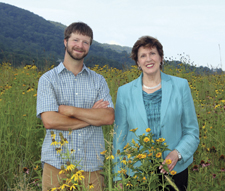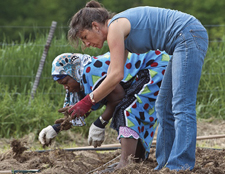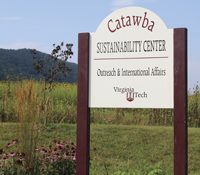|
Growing Smarter
Knowledge is cultivated at the
Catawba Sustainability Center, where
new and seasoned farmers alike can
come together to learn and grow.
By Deborah R. Huso, Contributing Writer

Kay Dunkley (right), director of the
Virginia Tech Roanoke Center, looks forward
to working with Jason Nease (left), the
newly hired director of the Catawba
Sustainability Center. Nease believes that
community is key in the center's success.
Laura Emery photo.
|
When Kay Dunkley was a little girl, she remembers sitting
around the dinner table listening to her father talk about how he could
increase the bottom line for their family�s dairy and beef farm. Dunkley�s
father found the answer in cattle feed. �I recall his comments about proper
nutrition for cows and how the quality of hay and the nutrients in grains
could affect milk production,� she explains. Dunkley says switching feeds
(and their chemicals) resulted in a better quality of milk, which bumped up
their price per gallon.
That memory stuck with her for life.
Today Dunkley, who is the director of the Virginia Tech
Roanoke Center, works with the Catawba Sustainability Center. This project
offers a plethora of opportunities for new and experienced farmers to learn
how to better their practices. In addition, it also gives students at
Virginia Tech an opportunity to take advantage of hands-on learning.
Real-World
Problem Solving
The center, located just off interstate 81 in Catawba, is
a place for real-world agricultural problem solving. Students, faculty,
community members, and farmers are working together to learn and experiment
with new methods for increasing farming profit and solving complex
sustainability issues.
The farm was originally owned by Catawba Hospital, which
opened in 1909 as Virginia�s first tuberculosis sanitarium and continues to
operate as a mental health facility. The farm provided meat and dairy
products for hospital staff and patients until 1988 when the need for the
dairy diminished with the industrialization of the nation�s food supply
system. At that point, the hospital transferred 377 acres of its holdings to
Virginia Tech, which uses the farm for research and education through its
College of Agriculture and Life Sciences. Recently the project underwent
administrative renovations when the Virginia Tech Roanoke Center took over
responsibility for the farm.

Christy Gabbard sows flower seeds with
Hajiro Wehel, a Bantu refugee from Somalia who participated in the
center's Grower's Academy program, Photo courtesy of Virginia Tech. |
Christy Gabbard, whom Dunkley credits for the center�s
success, served as the director of the Catawba Sustain�ability Center and
oversaw its day-to-day operations up until July. �We basically have a living
learning facility,� explains Gabbard, who was originally part of a group of
community members called Catawba Landcare, which laid the groundwork for
founding the Catawba Sustainability Center. Catawba Landcare formed in 2005
after a visit from Australian Landcare representatives through Virginia
Tech. The visitors told the community about the Landcare program, which
works to bring residents together, encourages sustainable management of land
and resources, and creates business opportunities that support good land
management. �Catawba Landcare has been instrumental,� says Gabbard, who
indicates the group assists in spreading the word about the Catawba
Sustainability Center throughout the community and acts as a voice for
locals who want to see new programs or learning opportunities established at
the center.
In 2005, the farm was sitting idle and not being used by
Virginia Tech, so members of Catawba Landcare jumped at the opportunity to
turn the farm into something positive for the community. �We also noticed
there was a lack of business development opportunities for the local food
business,� explains Gabbard. So working with Virginia Tech, Gabbard and
Catawba Landcare decided to create a platform for university education and
engagement with the local community.
Three-Pronged Approach
The farm currently provides a haven for the three most
important aspects of the organization�s mission: business development,
community outreach, and learning and discovery. And without the teamwork
among Gabbard, Virginia Tech, Catawba Landcare, and the community of
Catawba, the center�s current success and future goals would not be
possible.
In addition to being the sole administrator for the
Catawba Sustainability Center, Gabbard spearheaded new educational efforts
under the VT EarthWorks program, a business-acceleration program for
land-based businesses, such as producers of local food, biomass for energy,
and sustainable wood products. Since the center�s opening in 2008, Gabbard
has worked with individuals and partners to organize a variety of
opportunities for the community through this program. The center offers
workshops on occasion to educate farmers and landowners about water-quality
issues or better practices for meat or produce production. The center hosts
a local farmers� market every Thursday from 3:30 p.m. to 7 p.m. from May
through October. VT EarthWorks is also organizing the Roanoke Valley
Locavore Directory and the New River Valley Local Food Directory, both of
which list sources for local foods. In addition, VT EarthWorks offers land
for lease at the Catawba Sustainability Center to growers in need.

The Catawba Sustainability Center is nestled
in beautiful Catawba Valley not far from Salem and Roanoke.
Laura Emery photo. |
Local farmers David and Constance Wright take advantage
of the facilities at the center. Even though this is their first season at
the farm, the Wrights say the additional half-acre has already made a
difference in their business, which consists of about one-eighth of an acre
of additional raised beds and gardens at their Cave Springs residence,
located about 16 miles from the Catawba Sustainability Center. �We didn�t
have enough land,� explains David. �The center has allowed us to grow so
much more.� David also indicates the soil found at the center is another
benefit. �Working in this soil is so much better than what I�m used to,�
explains David, who has to fight with rocks, gravel, and clay at his
residence. And while the Wrights had already reached their goal of selling
produce year-round, David says having the extra garden space allows them to
offer more variety to their customers making their business, which sells
onions, sweet potatoes, turnips, potatoes, tomatoes, green corn, beets, and
butternut squash, more competitive.
Hands-On Experience
The farm also provides Virginia Tech students the
opportunity for hands-on learning. Since 2008, the Catawba Sustain�ability
Center has served as a kind of laboratory for faculty and students from the
colleges of Agriculture and Life Sciences, Architecture and Urban Studies,
Business, Engineering, Liberal Arts and Human Sciences, and Natural
Resources and Environment. In the last year, the center has provided
experiential learning opportunities for over 100 undergraduates, eight
graduate students, one intern, and 53 student volunteers. Though students in
other concentrations are not currently using the farm, Dunkley says there is
definitely potential. �I think there are ways to include the arts and
liberal sciences,� explains Dunkley, who says the beautiful mountain
surroundings are ideal for inspiring writers and other artists.
The Catawba Sustainability Center is not only assisting
local producers but international farmers as well. Last year, a group of
Somali Bantu refugees traveled to Catawba to learn farming practices. The
refugees, who knew very little English, learned how to produce crops and
returned to Somalia with the knowledge to successfully market and sell their
products to consumers. �I think that�s one of the most heart-warming things
� what it does for them to take pride in what they�re doing and what they�re
learning,� says Dunkley.
Center
Welcomes New Director
And even though Gabbard has now stepped down from her
position as director of the Catawba Sustainability Center to concentrate
more on her business, New River Lamb and Goat, which sells grass-fed meat,
Dunkley says the center is excited about welcoming new director Joshua Nease.
�When Christy left, she left the organization with so much momentum,� says
Nease, who has a degree in public relations with a minor in environmental
studies. After reading information about the position, a friend called Nease
and encouraged him to apply. �The property has a tremendous amount of
potential, says Nease. �Catawba is a small, tight-knit community, and
community is important. The more we can get the community working together,
the more everyone will benefit. I�m eager to get started.�
For More Info:
Catawba Sustainability Center
5075 Catawba Creek Road
Catawba, VA 24070
540-767-6114
www.vtrc.vt.edu/catawba
|
|